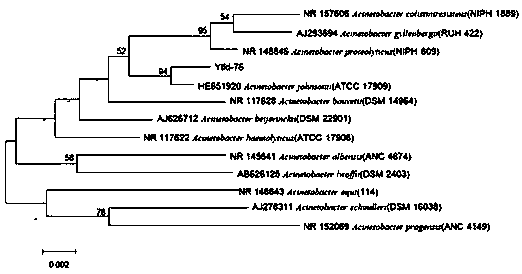A tyrosine ammonia lyase-producing strain and its application
A tyrosine and ammonia lyase technology is applied in the field of tyrosine ammonia lyase catalyzed preparation of p-hydroxycinnamic acid and derivatives, and can solve the problems of poor stability of tyrosine ammonia lyase, poor tolerance of catalytic products, and poor product tolerance. problems such as low concentration, to achieve the effect of being conducive to extraction and separation operations, broadening the channels of bacteria, and simple medium components
- Summary
- Abstract
- Description
- Claims
- Application Information
AI Technical Summary
Problems solved by technology
Method used
Image
Examples
Embodiment 1
[0026] Example 1: Classification of Acinetobacter johnsonii strains
[0027] 1) Strain characteristics
[0028] The colony on the preservation medium was milky white, nearly round, with a smooth and moist surface, shiny, and neat edges; observed under a microscope, the bacteria were rod-shaped, unable to move, and Gram-negative; the physiological and biochemical indicators are shown in Table 1.
[0029] Table 1 Physiological and biochemical characteristics of strain Ytld-76
[0030] project Ytld-76 project Ytld-76 Oxidase - VP test - starch - Catalase test + Nitrate reduction - Citric acid utilization + Urease - gelatin hydrolysis -
[0031] 2) Strain identification
[0032] The length of the 16S rRNA gene sequence obtained by DNA extraction, PCR amplification and sequencing was 1446 bp, and the BLAST comparison was performed on GenBank and the phylogenetic tree was drawn ( figure 1 ), it was concluded that the base si...
Embodiment 2
[0040] Example 2 Bacterial strain cultivation and p-hydroxycinnamic acid synthesis
[0041] 1) Strain activation: pick strains to solid preservation medium: yeast extract powder 5 g / L, peptone 10 g / L, NaCl 5 g / L, agar 20 g / L, pH 7.0, streak inoculation in a constant temperature incubator Cultivate at 30°C for 48 hours;
[0042] 2) Preparation of liquid seeds: pick one ring of activated strains and inoculate them in a 500 mL Erlenmeyer flask containing 50 mL of liquid seed medium, seal the seal with eight layers of gauze, and culture at 30°C for 24 hours on a shaker at 200 r / min to obtain liquid seeds; Described liquid seed medium component and final concentration thereof: sodium acetate 5 g / L, (NH 4 ) 2 SO 4 1g / L, KH 2 PO 4 1g / L, MgSO 4 0.1g / L, peptone 5 g / L, yeast extract powder 1 g / L, pH 7.0;
[0043] 3) Liquid fermentation: add liquid seeds into the fermentation medium according to the inoculum size of 5%, the composition and final concentration of the fermentation...
Embodiment 3
[0045] Embodiment 3 catalyzes L-tyrosine to produce p-hydroxycinnamic acid
[0046] 1) Strain activation: pick the strains into the solid preservation medium, inoculate them in a constant temperature incubator at 30°C for 48 hours; the composition and final concentration of the solid preservation medium: yeast extract powder 5 g / L, peptone 10 g / L, NaCl 5 g / L, agar 20 g / L, pH 7.0;
[0047] 2) Preparation of liquid seeds: pick one ring of activated strains and inoculate them in a 500 mL Erlenmeyer flask containing 50 mL of liquid seed medium, seal the seal with eight layers of gauze, and culture at 30°C for 24 hours on a shaker at 200 r / min to obtain liquid seeds; Described liquid seed medium component: sodium acetate 8 g / L, (NH 4 ) 2 SO 4 3g / L, KH 2 PO 4 2g / L, MgSO 4 0.5g / L, peptone 5 g / L, yeast extract 2 g / L, pH 7.0,
[0048] 3) Liquid fermentation: according to the inoculum amount of 5%, the composition is sodium acetate 10 g / L, sodium citrate 3 g / L, (NH 4 ) 2 SO ...
PUM
 Login to View More
Login to View More Abstract
Description
Claims
Application Information
 Login to View More
Login to View More - R&D
- Intellectual Property
- Life Sciences
- Materials
- Tech Scout
- Unparalleled Data Quality
- Higher Quality Content
- 60% Fewer Hallucinations
Browse by: Latest US Patents, China's latest patents, Technical Efficacy Thesaurus, Application Domain, Technology Topic, Popular Technical Reports.
© 2025 PatSnap. All rights reserved.Legal|Privacy policy|Modern Slavery Act Transparency Statement|Sitemap|About US| Contact US: help@patsnap.com

